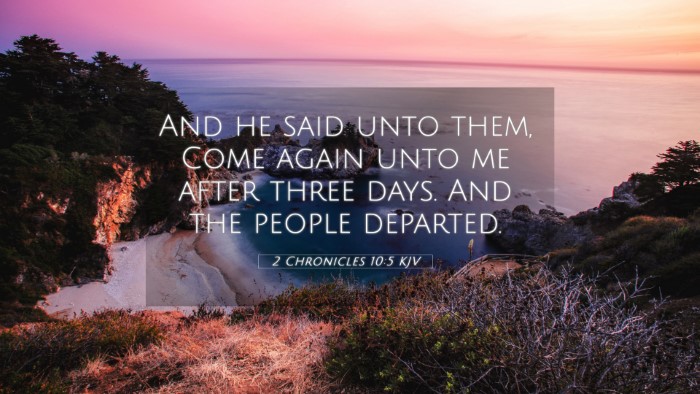Understanding 2 Chronicles 10:5
Verse: "And he said unto them, Come again unto me after three days. And the people departed." (2 Chronicles 10:5)
This verse captures a decisive moment in the narrative of King Rehoboam, the son of Solomon, as he is confronted by the people of Israel who seek relief from the heavy taxation imposed by Solomon. Here, Rehoboam displays both caution and wisdom in seeking time to consider the counsel he receives.
Insights from Public Domain Commentaries
Matthew Henry's Commentary
Matthew Henry emphasizes the importance of seeking counsel and the need for leaders to listen to their subjects. The phrase "Come again unto me after three days" illustrates Rehoboam's intention to deliberate and consult with both the elder advisors and his peers. Henry notes that this moment reflects Rehoboam's indecision, which later leads to a split in the kingdom.
Albert Barnes' Notes on the Bible
Albert Barnes highlights the significance of the three days mentioned. This period serves as a critical juncture in the decision-making process. Barnes points out that Rehoboam's request for time is both a sign of his uncertainty and an opportunity to weigh the wisdom of different counsel. The divergence in advice—from the elders' experienced perspective to the youthful approach of his peers—sets the stage for future conflict.
Adam Clarke's Commentary
Adam Clarke provides a deeper exploration of the political implications of Rehoboam's decision. By asking for three days, he not only seeks time for reflection but also attempts to assess the political landscape. Clarke suggests that this moment demonstrates Rehoboam's initial thoughtfulness, though it foreshadows the poor choices to come that would fracture Israel's unity.
Key Themes and Connections
This verse serves as a pivotal point where themes of leadership, wisdom, and the impact of decision-making emerge. To comprehend its full meaning, it is helpful to cross-reference it with related verses:
- 1 Kings 12:5: "And he said unto them, Depart yet for three days, then come again to me." - A parallel account of Rehoboam's decision.
- Proverbs 15:22: "Without counsel purposes are disappointed: but in the multitude of counsellors they are established." - Highlights the importance of wise counsel.
- Ezekiel 18:30: "Therefore I will judge you, O house of Israel, every one according to his ways, saith the Lord GOD." - Emphasizes accountability in leadership.
- Ecclesiastes 10:16-17: "Woe to thee, O land, when thy king is a child..." - Reflects on the dangers of immature leadership.
- Proverbs 20:18: "Every purpose is established by counsel: and with good advice make war." - Again stresses the value of wise counsel in decision-making.
- 2 Samuel 15:12: "Absalom sent for Ahithophel the Gilonite, David's counselor, from his city, even from Giloh..." - A contrasting view of counsel and its implications.
- James 1:5: "If any of you lack wisdom, let him ask of God..." - Encourages seeking divine wisdom in decision-making.
Lessons from 2 Chronicles 10:5
The interactions seen in this verse highlight key lessons for both leaders and individuals:
- Importance of Listening: Rehoboam's initial willingness to consider the people's request shows that effective leadership involves listening to constituents.
- Valuing Counsel: The contrast between different types of advice serves as a reminder that wisdom comes from diverse sources.
- Consideration of Consequences: Leaders must be mindful of how their decisions will impact the community as a whole.
Conclusion
In 2 Chronicles 10:5, we find a significant moment of decision-making that has profound implications for the future of Israel. The reflection on seeking counsel and the weight of leadership decisions continues to resonate today. By exploring the connections between this and other Bible verses, we enrich our understanding of the themes of wisdom, leadership, and the consequences of our choices.
Through tools for Bible cross-referencing, such as concordances and cross-reference guides, we can delve deeper into these connections, enhancing our comprehension of Scripture and its teachings.




